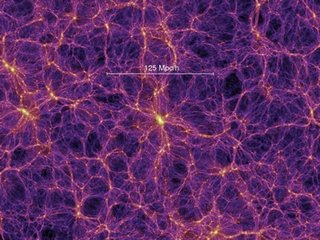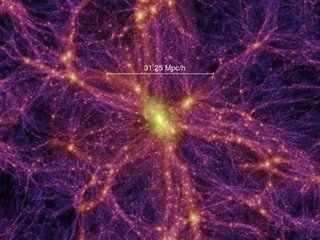Neuroscience

 Does the large-scale structure of the universe resemble a big neural net? Yes, I know it sounds somewhat ridiculous, but I couldn't help making the association when I saw these pictures of the large-scale structure of the universe. What would be the implications of a universe-wide intelligence made explicit in the large-scale structure of the universe and its interactions?!
Does the large-scale structure of the universe resemble a big neural net? Yes, I know it sounds somewhat ridiculous, but I couldn't help making the association when I saw these pictures of the large-scale structure of the universe. What would be the implications of a universe-wide intelligence made explicit in the large-scale structure of the universe and its interactions?!
Ok, I'm being somewhat tongue-in-cheek here, but the reticular large-scale structure of the universe does bear striking similarities to the reticular organization of the nervous system.
Project Description:
The Virgo consortium, an international group of astrophysicists from the UK, Germany, Japan, Canada and the USA released in June 02, 2005 the first results from the largest and most realistic simulation ever of the growth of cosmic structure and the formation of galaxies and quasars. In a paper published in Nature, the Virgo Consortium showed how comparing such simulated data to large observational surveys can reveal the physical processes underlying the build-up of real galaxies and black holes.
The "Millennium Simulation" employed more than 10 billion particles of matter to trace the evolution of the matter distribution in a cubic region of the Universe over 2 billion light-years on a side, in the largest ever model of the Universe. It kept the principal supercomputer at the Max Planck Society's Supercomputing Centre in Garching, Germany occupied for more than a month. By applying sophisticated modelling techniques to the 25 Terabytes (25 million Megabytes) of stored output, Virgo scientists are able to recreate evolutionary histories for the approximately 20 million galaxies, which populate this enormous volume, and for the supermassive black holes occasionally seen as quasars at their hearts.
"It is the biggest thing we have ever done," said Carlos Frenk of the University of Durham. "It is probably the biggest thing ever in computational physics. For the first time we have a replica universe which looks just like the real one. So we can now for the first time begin to experiment with the universe.
- Webcasts
Another treasure trove of webcasts: The Science Museum's Dana Centre UK hosts an ongoing series of public events at d.cafe, webcast live from London every few weeks and, of course, archived. Encompassing many branches of science, quite a few are about...
- Russian Has World's Greatest Eyebrows...
...and Refuses Math's Highest Honor. He clearly Threw His Tweezers Away long ago. This undated photo released by the International Mathematician Congress shows Grigori Perelman, from Russia, who was awarded with a prestigious Fields Medal at the International...
- Let's Celebrate The Real Big Questions
Although it isn't directly relevant to neuroscience or neuropsychology, this excellent essay from Lawrence Krauss in the September (2008) edition of New Scientist discusses premises that I often encounter in my discussions with people: LAST year I...
- Quotes Of Whoa #1
As part of the whoa-ness theme of this blog, a large amount of whoa can be found in science soundbites. I'm gonna start a series of these Quotes of Whoa and post them as and when I find them. Here's the first one, aptly from one of my favourite...
- "what's In A Rose? That Which We Call A Name": Semiotics In Science
"What's the use of their having names," the Gnat said, "if they won't answer to them?""No use to them," said Alice; "but it's useful to the people that name them, I suppose. If not, why do they have names at all?""I can't say," the Gnat...
Neuroscience
Universe as Neural Net?

 Does the large-scale structure of the universe resemble a big neural net? Yes, I know it sounds somewhat ridiculous, but I couldn't help making the association when I saw these pictures of the large-scale structure of the universe. What would be the implications of a universe-wide intelligence made explicit in the large-scale structure of the universe and its interactions?!
Does the large-scale structure of the universe resemble a big neural net? Yes, I know it sounds somewhat ridiculous, but I couldn't help making the association when I saw these pictures of the large-scale structure of the universe. What would be the implications of a universe-wide intelligence made explicit in the large-scale structure of the universe and its interactions?!Ok, I'm being somewhat tongue-in-cheek here, but the reticular large-scale structure of the universe does bear striking similarities to the reticular organization of the nervous system.
Project Description:
The Virgo consortium, an international group of astrophysicists from the UK, Germany, Japan, Canada and the USA released in June 02, 2005 the first results from the largest and most realistic simulation ever of the growth of cosmic structure and the formation of galaxies and quasars. In a paper published in Nature, the Virgo Consortium showed how comparing such simulated data to large observational surveys can reveal the physical processes underlying the build-up of real galaxies and black holes.
The "Millennium Simulation" employed more than 10 billion particles of matter to trace the evolution of the matter distribution in a cubic region of the Universe over 2 billion light-years on a side, in the largest ever model of the Universe. It kept the principal supercomputer at the Max Planck Society's Supercomputing Centre in Garching, Germany occupied for more than a month. By applying sophisticated modelling techniques to the 25 Terabytes (25 million Megabytes) of stored output, Virgo scientists are able to recreate evolutionary histories for the approximately 20 million galaxies, which populate this enormous volume, and for the supermassive black holes occasionally seen as quasars at their hearts.
"It is the biggest thing we have ever done," said Carlos Frenk of the University of Durham. "It is probably the biggest thing ever in computational physics. For the first time we have a replica universe which looks just like the real one. So we can now for the first time begin to experiment with the universe.
- Webcasts
Another treasure trove of webcasts: The Science Museum's Dana Centre UK hosts an ongoing series of public events at d.cafe, webcast live from London every few weeks and, of course, archived. Encompassing many branches of science, quite a few are about...
- Russian Has World's Greatest Eyebrows...
...and Refuses Math's Highest Honor. He clearly Threw His Tweezers Away long ago. This undated photo released by the International Mathematician Congress shows Grigori Perelman, from Russia, who was awarded with a prestigious Fields Medal at the International...
- Let's Celebrate The Real Big Questions
Although it isn't directly relevant to neuroscience or neuropsychology, this excellent essay from Lawrence Krauss in the September (2008) edition of New Scientist discusses premises that I often encounter in my discussions with people: LAST year I...
- Quotes Of Whoa #1
As part of the whoa-ness theme of this blog, a large amount of whoa can be found in science soundbites. I'm gonna start a series of these Quotes of Whoa and post them as and when I find them. Here's the first one, aptly from one of my favourite...
- "what's In A Rose? That Which We Call A Name": Semiotics In Science
"What's the use of their having names," the Gnat said, "if they won't answer to them?""No use to them," said Alice; "but it's useful to the people that name them, I suppose. If not, why do they have names at all?""I can't say," the Gnat...
